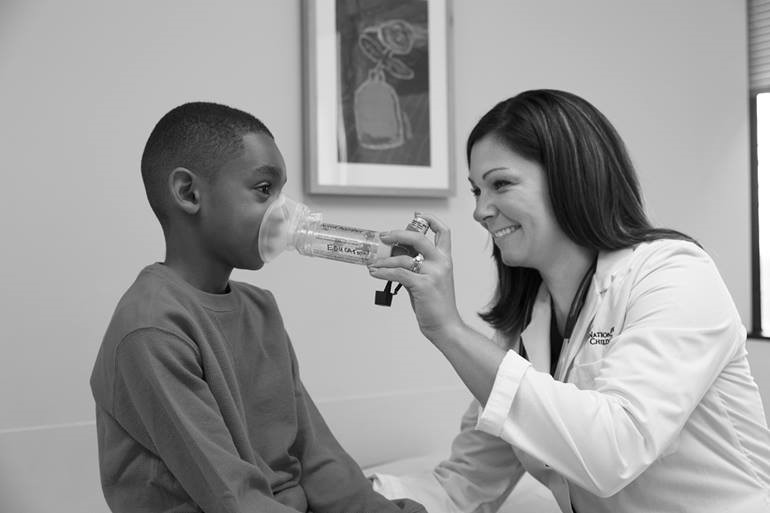How Practical COVID-19 Education for Community Providers Sprang From a Pediatric Behavioral Health Project ECHO
How Practical COVID-19 Education for Community Providers Sprang From a Pediatric Behavioral Health Project ECHO https://pediatricsnationwide.org/wp-content/uploads/2020/05/Targeting-Therapies_header-for-web-1024x575.jpg 1024 575 Katie Brind'Amour, PhD, MS, CHES Katie Brind'Amour, PhD, MS, CHES https://pediatricsnationwide.org/wp-content/uploads/2021/03/Katie-B-portrait.gif- May 28, 2020
- Katie Brind'Amour, PhD, MS, CHES

When Partners For Kids® (PFK) and Nationwide Children’s Hospital launched Project ECHO in 2018, they did it to help community providers cope with common behavioral health conditions in their patient populations. Unexpectedly, it became a tool to supply Ohio physicians with some of the most proactive education in the nation about adapting their business practices to accommodate COVID-19-related changes in medical care.
“Pediatric behavioral health has a critical shortage in providers nationally. Even though we have one of the largest departments in the country, we still cannot meet the needs of the population through traditional face-to-face clinic care,” says Ujjwal Ramtekkar, MD, MPE, MBA, associate medical director for PFK and a pediatric psychiatrist for Nationwide Children’s. “Thankfully, the idea of democratizing clinical knowledge via something like Project ECHO falls exactly in line with Nationwide Children’s care model, in that it provides and extends our expertise to the local communities to serve and support them better. It helps ensure that children’s access to appropriate, timely care isn’t dictated by their zip code.”
Project ECHO originated at the University of New Mexico and is a clinician education program designed to use interactive teleconferences to transfer knowledge from a “hub” (often a tertiary care center) to a cohort of “spokes” (usually community practices). The goal is to improve patient care and outcomes while reducing unnecessary referrals and shortening wait times for patients most in need of expert-level care. Although each bi-weekly session includes a short didactic presentation by the hub’s specialists, the bulk of each meeting is devoted to case-based, team problem solving—providing the tools for ongoing management of common problems often seen in specialty care clinics that can be successfully managed in primary care settings.
As COVID-19 forced practices to close or change to telehealth, the behavioral health Project ECHO cohort discussed the unexpected challenges they were facing.
“Providers were overwhelmed and uncertain about practice management, facing challenges with their own morale and that of their staff, and facing a lot of difficulties around practical application of new COVID-19 requirements,” says Dr. Ramtekkar, who coauthored national practice guidelines on telehealth in pediatric behavioral health. “Even though they are getting a lot of information on COVID-19 from a clinical perspective, there’s been nothing to help them problem solve from a day-to-day practice perspective. How do you bill for virtual visits? How do you build rapport over the computer screen? How do you deal with patient emergencies? And how do you protect your own wellbeing when you’re playing doctor and parent and teacher and housekeeper?”
The PFK and Nationwide Children’s Project ECHO team set out to help the cohort through a special four-session series on practical techniques for practice management during COVID-19, drawing on the expertise of their internal information technology experts and other specialists. The mini-series ran in April and May and covered a number of other relevant topics—such as digital HIPAA-compliant communication options—that facilitated greater comfort levels with telehealth among community participants.
Nationwide Children’s behavioral health program had already begun increasing telehealth visits prior to the pandemic. This preparation allowed rapid scaling during the initial weeks of COVID-19, with 2,000 virtual visits performed in the first week alone and 13,000 completed by the third week. Nearly 100% of outpatient behavioral health visits are now virtual.
It is expected that COVID-19 will only exacerbate the shortage of pediatric behavioral health specialists in the coming years, as the inevitable psychosocial fallout—already resulting in increased cases of child abuse—materializes in the wake of the global pandemic.
“Face-to-face care isn’t a sustainable model for our specialty anymore. Innovative telehealth models like Project ECHO will be ideal for disseminating knowledge at a fast rate, in a way that builds skills for physicians to apply directly in practice,” says Dr. Ramtekkar. “COVID-19 gave an opportunity to demonstrate not just the feasibility of a new model of care, but also how technology can be leveraged to reach the masses and increase the clinical capacity of communities. It’s a huge return on investment for the hub, with a minimal impact on our time and resources.”
Many major tertiary care centers now offer similar digital support for community physicians struggling with COVID-19-related practice adjustments. Any interested specialty center can do the same, either utilizing their existing resources or via the formal, free hub training offered by the University of New Mexico.
As the Project ECHO initiative grows at Nationwide Children’s, the behavioral health team has big plans for the future. The initial two cohorts were so successful that the effort has expanded to provide two additional basic education cohorts per year, as well as five sub-topic series available to clinicians who have completed the initial sessions. The specialty themes provide a deeper foundation in pediatric behavioral health concerns that clinicians routinely encounter, such as anxiety and depression, attention deficit and hyperactivity disorder (ADHD), eating disorders, gender identity, substance abuse and trauma.
“PFK and Nationwide Children’s are looking at the larger puzzle to develop a good continuum of services and system of care for children in Ohio,” Dr. Ramtekkar says. The Project ECHO team is preparing to offer “office hours” for additional support of cohort members and scheduled sessions to discuss difficult cases, resource management or diagnostic clarification.
Additional support for practices in the PFK network will include on-site support to train practices in more advanced behavioral health support and provide referral management or care coordination. Several other specialty programs at Nationwide Children’s are now considering Project ECHO initiatives to improve provider knowledge and reduce wait times for the children most in need.
“It’s a nice bidirectional system of care in the best interest of children, and it’s very supportive of primary care practices,” Dr. Ramtekkar explains. “It’s also a good time investment—it builds capacity for early identification and management of mental health problems and avoids the need for tertiary care by changing the health trajectory of these kids early on. That’s a major win-win-win.”
References:
- American Academy of Child & Adolescent Psychiatry. The Child and Adolescent Telepsychiatry Toolkit. Accessed online 19 May 2020.
- Khan S, Ramtekkar U. Child and adolescent telepsychiatry education and training. Psychiatric Clinics of North America. 2019 Dec;42(4):555-562.
Image credit: Nationwide Children’s
About the author
Katherine (Katie) Brind’Amour is a freelance medical and health science writer based in Pennsylvania. She has written about nearly every therapeutic area for patients, doctors and the general public. Dr. Brind’Amour specializes in health literacy and patient education. She completed her BS and MS degrees in Biology at Arizona State University and her PhD in Health Services Management and Policy at The Ohio State University. She is a Certified Health Education Specialist and is interested in health promotion via health programs and the communication of medical information.
-
Katie Brind'Amour, PhD, MS, CHEShttps://pediatricsnationwide.org/author/katie-brindamour-phd-ms-ches/April 27, 2014
-
Katie Brind'Amour, PhD, MS, CHEShttps://pediatricsnationwide.org/author/katie-brindamour-phd-ms-ches/April 27, 2014
-
Katie Brind'Amour, PhD, MS, CHEShttps://pediatricsnationwide.org/author/katie-brindamour-phd-ms-ches/April 27, 2014
-
Katie Brind'Amour, PhD, MS, CHEShttps://pediatricsnationwide.org/author/katie-brindamour-phd-ms-ches/April 28, 2014
- Posted In:
- Features







